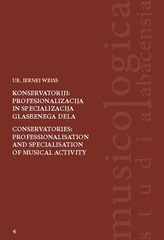Приказ основних података о документу
Beginnings of the Piano Department at the Belgrade Music Academy
| dc.contributor | Weiss, Jernej | |
| dc.creator | Medić, Ivana | |
| dc.date.accessioned | 2020-12-31T00:14:10Z | |
| dc.date.available | 2020-12-31T00:14:10Z | |
| dc.date.issued | 2020 | |
| dc.identifier.isbn | 978-961-7055-86-3 (pdf) | |
| dc.identifier.isbn | 978-961-7055-87-0 (html) | |
| dc.identifier.uri | http://www.hippocampus.si/ISBN/978-961-7055-86-3.pdf | |
| dc.identifier.uri | https://dais.sanu.ac.rs/123456789/10168 | |
| dc.description.abstract | Prior to the establishment of the frst tertiary educational institution for studying music, the Belgrade Music Academy in 1937, there were two music schools in Belgrade: “Mokranjac” (previously Belgrade Music School, founded in 1899 by the Belgrade Singing Society) and “Stanković” (founded in 1911 by the eponymous singing society). Ever since the end of the Great War, there were initiatives to transform this private domain into public and to establish a state-funded music conservatory. Indeed, both schools had ambitions to expand into conservatories; “Stanković” accomplished this feat in the early 1930s during Emil Hajek’s tenure as the school principal – albeit, still without a comprehensive state support. On the other hand, in 1925 Jovan Zorko, the principal of the “Mokranjac” music school, submitted a request to the Ministry of Education to upgrade the school to the level of conservatory, but the Ministry rejected it, on the basis that logistic requirements were not met; moreover, they again rejected the school’s request to become nationalized. Tis reluctance of the Ministry of Education to nationalize private music schools in Belgrade and to upgrade their status created a stark contrast to the situation in other Yugoslav cultural centers, Zagreb and Ljubljana, where the existing music schools were nationalized and elevated to the level of conservatories afer the Great War. Terefore, ambitious students from Belgrade and other Serbian towns who wished to continue their music education at the tertiary level were forced to move either to Zagreb or Ljubljana, or to big European centres such as Paris, Vienna, Prague, Berlin, Munich, Leipzig, Rome etc., which had a long-standing tradition of tertiary music education. | sr |
| dc.language.iso | en | sr |
| dc.publisher | Koper : Univerze na Primorskem | sr |
| dc.publisher | Ljubljana : Festival Ljubljana | sr |
| dc.rights | openAccess | sr |
| dc.rights.uri | https://creativecommons.org/licenses/by-nc-nd/4.0/ | |
| dc.source | Konservatoriji: profesionalizacija in specializacija glasbenega dela / Te conservatories: professionalisation and specialisation of musical activity | sr |
| dc.subject | Belgrade Music Academy | sr |
| dc.subject | Piano Department | sr |
| dc.title | Beginnings of the Piano Department at the Belgrade Music Academy | sr |
| dc.type | bookPart | sr |
| dc.rights.license | BY-NC-ND | sr |
| dcterms.abstract | Медић, Ивана; | |
| dc.citation.spage | 383 | |
| dc.citation.epage | 399 | |
| dc.identifier.doi | 10.26493/978-961-7055-86-3.383-399 | |
| dc.identifier.cobiss | 303515648 | |
| dc.type.version | publishedVersion | sr |
| dc.identifier.fulltext | https://dais.sanu.ac.rs/bitstream/id/41737/bitstream_41737.pdf | |
| dc.identifier.rcub | https://hdl.handle.net/21.15107/rcub_dais_10168 |

